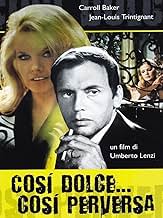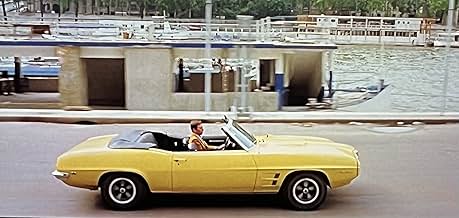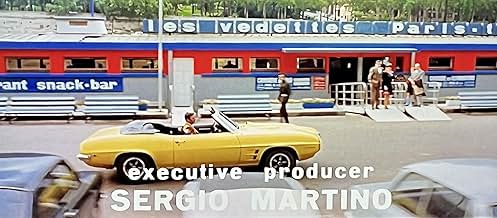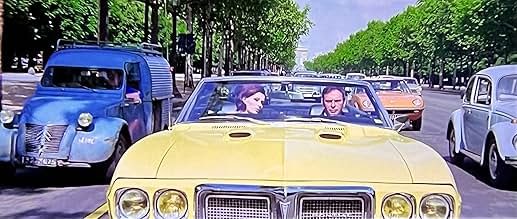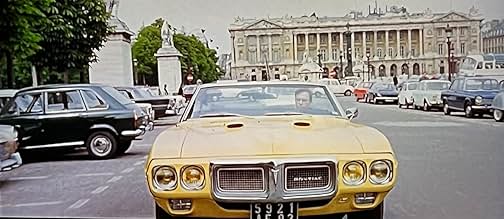IMDb RATING
6.0/10
1.4K
YOUR RATING
An unhappily married Parisian industrialist is pulled into a web of lust and deception after he seemingly rescues his new neighbor from her abusive boyfriend.An unhappily married Parisian industrialist is pulled into a web of lust and deception after he seemingly rescues his new neighbor from her abusive boyfriend.An unhappily married Parisian industrialist is pulled into a web of lust and deception after he seemingly rescues his new neighbor from her abusive boyfriend.
- Director
- Writers
- Stars
Jean-Louis Trintignant
- Jean Reynaud
- (as Jean Louis Trintignant)
Giovanni Di Benedetto
- Monsieur Valmont
- (as Gianni Di Benedetto)
Marcello Bonini Olas
- Party Guest
- (uncredited)
Anna Scalzi
- Jean's Secretary
- (uncredited)
Alessandro Tedeschi
- Uomo Della Commissione
- (uncredited)
- Director
- Writers
- All cast & crew
- Production, box office & more at IMDbPro
Featured reviews
A zillionaire (Jean-Louis Trintignant) strays from his frigid wife Danielle (Erika Blanc), winding up in an affair with a woman named Nicole (Carroll Baker). All goes well until Nicole's ex-lover Klaus (Horst Frank) starts creeping around.
SO SWEET... SO PERVERSE is a twisty giallo from Director Umberto Lenzi. The story seems to take its cues from DIABOLIQUE. While not quite as masterful as that film this movie does have its memorable moments, especially during the finale.
Ms.' Baker and Blanc are as beautifully beguiling as ever, and Frank is extraordinarily sinister! He's always been a good heavy, and uses his skills well here...
SO SWEET... SO PERVERSE is a twisty giallo from Director Umberto Lenzi. The story seems to take its cues from DIABOLIQUE. While not quite as masterful as that film this movie does have its memorable moments, especially during the finale.
Ms.' Baker and Blanc are as beautifully beguiling as ever, and Frank is extraordinarily sinister! He's always been a good heavy, and uses his skills well here...
Wikipedia calls this a giallo film, which I don't entirely see. I guess giallo doesn't have to be horror, but still. I guess the closer it leans into giallo stuff, the better So Sweet...So Perverse. There are some really feverish and bizarre scenes that play out in a zone that's somewhere between dream and nightmare. When things get more focused on the drama (all around a scheme that involves murder and infidelity), it's appropriately silly and heightened. It doesn't push those things too far, to the point where the film starts becoming an accidental parody of itself, but it comes fairly close in any event.
I came away from it not feeling hugely enthusiastic, but for some of its offbeat energy, a few sequences, and an undeniable sense of style, I also can't call it bad.
I came away from it not feeling hugely enthusiastic, but for some of its offbeat energy, a few sequences, and an undeniable sense of style, I also can't call it bad.
The giallo may have been pioneered by the great Mario Bava and spectacularly refined by Dario Argento, but Umberto Lenzi was developing the techniques and stylings we now know and love from the mid-1960s. Before he became known for schlocky horror trash like Eaten Alive!, Nightmare City and Cannibal Ferox, Lenzi was toying with rich socialites and exploring pulpy, dime-store stories that often involved ridiculous, labyrinthine plots, psychedelic interiors, and beautiful, untrustworthy women. These are all ingredients of the giallo, and some of these early Lenzi efforts hint at a director with an eye for kitschy visuals, something that certainly doesn't come to mind when you watch a native tribesman scalp a poor traveller in the despicable Cannibal Ferox. These eye-catching visuals are certainly present in his 1969 film So Sweet... So Perverse, but there isn't much else to hold the attention in this plodding soap opera.
Handsome, jet-setting socialite Jean Reynaud (Jean-Louis Trintignant) enjoys a lavish lifestyle of cocktail parties and shooting ranges, but he has grown bored and frustrated with the lack of passion in his marriage to the beautiful Danielle (Erika Blanc). To counter this, Jean sleeps with anybody who happens to catch his eye, including his friend Helene (Helga Line), and his head is turned by the woman who has just moved upstairs, Nicole (Carroll Baker). When he hears screams coming from above, he rushes to Nicole's aid, learning that she is stuck in an abusive sexual relationship with her husband Klaus (Horst Frank). As they spend more time together, the couple inevitably fall in love, yet whenever they escape for a weekend, Klaus always manages to track them down. After a night of passion, Nicole reveals that she and Klaus have actually been paid a hefty sum to lure in and eventually kill Jean, but that the one doing the hiring has not yet revealed themselves.
With such a cool-sounding title (yet another famous trait of the gialli), there is nothing sweet and little perverse about the film itself. Argento eventually set a high standard for story-telling and the slow-building of tension within a vital set-piece, and the likes of Lucio Fulci and Sergio Martino added gory violence and a graceful style into the mix, but So Sweet... So Perverse is frustratingly tame, failing to ignite much interest in the plot or generate any excitement when events take a more sinister tone. Where Lenzi ultimately excels is in the glossy cinematography and dazzling interiors, which are garish enough to amusingly satirise the world of these detached characters and their materialistic lifestyles. Images of sun-drenched locations, expensive suits and beautiful, provocative women add a sleazy glamour and seductive glaze to the film, a hedonistic way-of-life Lenzi is happy to indulge as he shrewdly condemns it. It isn't quite enough to prevent So Sweet... So Perverse from becoming little more than a curious cinematic artefact, that ultimately paved the way for better directors to come along and take this new genre by the scruff.
Handsome, jet-setting socialite Jean Reynaud (Jean-Louis Trintignant) enjoys a lavish lifestyle of cocktail parties and shooting ranges, but he has grown bored and frustrated with the lack of passion in his marriage to the beautiful Danielle (Erika Blanc). To counter this, Jean sleeps with anybody who happens to catch his eye, including his friend Helene (Helga Line), and his head is turned by the woman who has just moved upstairs, Nicole (Carroll Baker). When he hears screams coming from above, he rushes to Nicole's aid, learning that she is stuck in an abusive sexual relationship with her husband Klaus (Horst Frank). As they spend more time together, the couple inevitably fall in love, yet whenever they escape for a weekend, Klaus always manages to track them down. After a night of passion, Nicole reveals that she and Klaus have actually been paid a hefty sum to lure in and eventually kill Jean, but that the one doing the hiring has not yet revealed themselves.
With such a cool-sounding title (yet another famous trait of the gialli), there is nothing sweet and little perverse about the film itself. Argento eventually set a high standard for story-telling and the slow-building of tension within a vital set-piece, and the likes of Lucio Fulci and Sergio Martino added gory violence and a graceful style into the mix, but So Sweet... So Perverse is frustratingly tame, failing to ignite much interest in the plot or generate any excitement when events take a more sinister tone. Where Lenzi ultimately excels is in the glossy cinematography and dazzling interiors, which are garish enough to amusingly satirise the world of these detached characters and their materialistic lifestyles. Images of sun-drenched locations, expensive suits and beautiful, provocative women add a sleazy glamour and seductive glaze to the film, a hedonistic way-of-life Lenzi is happy to indulge as he shrewdly condemns it. It isn't quite enough to prevent So Sweet... So Perverse from becoming little more than a curious cinematic artefact, that ultimately paved the way for better directors to come along and take this new genre by the scruff.
It seems that prior to Dario Argento's The Bird With The Crystal Plumage that normal template for gialli was the 'mystery amongst devious people' rather than the 'loads of babes being sliced up'. This is yet another one of those films, with a rather low body count (two!).
Jean (he's a fanny rat, but hard to like, because he's French), is a rich playboy who is not getting any of his wife (Erika Blanc - she looks like David Bowie), so looks for other avenues to explore. When the film opens, he's banging his mate's wife, but soon he discovers a new blonde has moved into the apartment above his.
There's something strange going with this new blonde too, because Jean is hearing the scraping of furniture and what sounds like someone being slapped around, but when he goes to the front door of his new neighbour, no one answers. When he does finally get to meet her she claims that her boyfriend Klaus loves beating her up and stuff.
Soon the two fall in love (queue montage!) much to the dismay of Blanc and the delight of Klaus, and it's roughly about the halfway mark that the twists start happening so I'll stop there. Needless to say that one character goes from being vulnerable to evil, allegiances changes again and again and the hippy vibe of the late sixties shines through loud and clear.
However, Lenzi seems to have had a vision of the state of Italian film ten years later and injected the film with scenes that make no sense whatsoever, for instance the credits sequence. Jean drives about with a rifle in his car and we get flashes of one of his lovers but this has nothing to do with the rest of the film. Plus, Carrol Baker has a velvet lined cabinet in her apartment full of instruments of torture. This has nothing to do with anything either.
On the other side, Lenzi also injects an amazingly high amount of style into the film too, what with an early example of the use of primary colours (soon to be a trend in the gialli) - there's one scene that's stands out when Jean is forced to snog Carrol Baker while someone keeps changing the lighting to various colours, Nicely done.
Jean (he's a fanny rat, but hard to like, because he's French), is a rich playboy who is not getting any of his wife (Erika Blanc - she looks like David Bowie), so looks for other avenues to explore. When the film opens, he's banging his mate's wife, but soon he discovers a new blonde has moved into the apartment above his.
There's something strange going with this new blonde too, because Jean is hearing the scraping of furniture and what sounds like someone being slapped around, but when he goes to the front door of his new neighbour, no one answers. When he does finally get to meet her she claims that her boyfriend Klaus loves beating her up and stuff.
Soon the two fall in love (queue montage!) much to the dismay of Blanc and the delight of Klaus, and it's roughly about the halfway mark that the twists start happening so I'll stop there. Needless to say that one character goes from being vulnerable to evil, allegiances changes again and again and the hippy vibe of the late sixties shines through loud and clear.
However, Lenzi seems to have had a vision of the state of Italian film ten years later and injected the film with scenes that make no sense whatsoever, for instance the credits sequence. Jean drives about with a rifle in his car and we get flashes of one of his lovers but this has nothing to do with the rest of the film. Plus, Carrol Baker has a velvet lined cabinet in her apartment full of instruments of torture. This has nothing to do with anything either.
On the other side, Lenzi also injects an amazingly high amount of style into the film too, what with an early example of the use of primary colours (soon to be a trend in the gialli) - there's one scene that's stands out when Jean is forced to snog Carrol Baker while someone keeps changing the lighting to various colours, Nicely done.
Great title and if not particularly appropriate for the film, no matter, for this is a fine film. Carroll Baker, excellent as ever, although she does keep herself fairly well covered here and not always in the most stunning of outfits, Jean-Louis Trintignant does pretty much what he always does, well and Erika Blanc puts in a very strong performance. Solid directing by Lenzi, might have been stylish but pan and scan print ensures it does not appear so, and for the first half we have a rather fun, colourful and bright story of an extramarital affair. Things change, however, just as we begin to wonder if all is as it seems things change very much indeed. Hardly any blood or bare skin for that matter but a most involving tale, exceedingly well told, that certainly starts to flip about towards the end. Indeed until the very end!
Did you know
- TriviaSecond part of a trilogy also including Paranoia (1969) and A Quiet Place to Kill (1970).
- GoofsAerial shots of Jean skiing behind a boat show the stunt double jumping the wake, and skiing, one-handed, far to the side on the open water, switch back and forth between close-ups of Jean-Claude Trintingant, but in the close-ups he is always in the wake, both hands on grips, directly behind the boat.
- Quotes
Black Stripper: Taking your clothes off isn't any problem, you know, when there's enough loot.
Monsieur Valmont: They say she can be great when she's tight.
- ConnectionsFeatured in Yellow Fever: The Rise and Fall of the Giallo (2016)
- How long is So Sweet... So Perverse?Powered by Alexa
Details
- Release date
- Countries of origin
- Language
- Also known as
- Çok tatlı, çok ahlaksız
- Filming locations
- Punta Ala, Castiglione della Pescaia, Grosseto, Tuscany, Italy(scene by the sea)
- Production companies
- See more company credits at IMDbPro
Contribute to this page
Suggest an edit or add missing content


